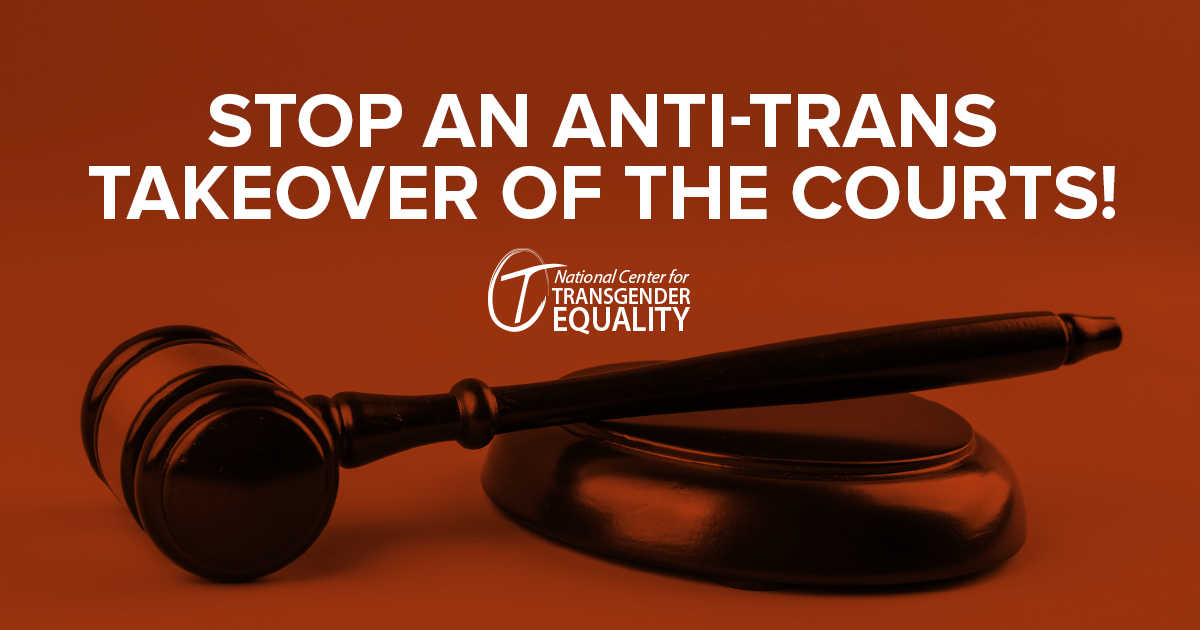NCTE Opposes the Nomination of Matthew McFarland
Imagen

For all Americans, including the nearly two million who are transgender, equal justice requires fair judges who will honestly and impartially weigh all the facts presented in any case, on any issue, and treat all litigants with dignity and respect. Unfortunately, Judge Matthew McFarland—the latest extreme nominee for a lifetime seat on a federal bench from the Trump administration—refused to state unequivocally that he will honor the requests of transgender litigants to be treated with basic courtesy and respect in the courtroom. His failure to do so does not meet the high standards for a lifetime appointment to a federal court.
Judge McFarland has refused to clearly answer whether he would show basic courtesy to parties and witnesses in litigation by honoring their request to be referred to in accordance with their gender identity in court. Judge McFarland’s evasive response was inadequate, particularly given that numerous other judicial nominees had no problem simply answering “Yes” to this question. In his responses to written questions for the record, he refused to answer this simple yes-or-no question, stating:
Q: Would you honor the request of a plaintiff, defendant, or witness in your courtroom who is transgender to be referred to in accordance with that person’s gender identity?McFarland: I would treat each person appearing in court with dignity and respect in all regards.
It is a fundamental and obvious requirement that a federal judge demonstrate a judicial temperament and a high level of professionalism and civility, including courtesy and respect toward all parties, witnesses, and others in their courtroom. The Code of Conduct for United States Judges provides that “A judge should be patient, dignified, respectful, and courteous to litigants, jurors, witnesses, lawyers, and others with whom the judge deals in an official capacity.”
A fundamental aspect of civility in the courtroom is avoiding terms of address for a party or other person that that person has made clear would be deeply offensive to them. This basic axiom was recognized by the Supreme Court in Hamilton v. Alabama, 376 U.S. 650 (1964). In that case, Mary Hamilton was found contempt by a Virginia county court because she refused to give testimony so long as she was addressed only by her first name. Ms. Hamilton was objecting to a common practice at that time whereby Black persons were not addressed by respectful titles such as “Mr.,” “Miss,” or “Mrs.,” which officials routinely accorded to white parties and witnesses. Ms. Hamilton rightly viewed this as disrespectful of her person, and the Supreme Court agreed, summarily reversing the lower court and siding with Ms. Hamilton’s simple request. Setting aside any legal question, Ms. Hamilton’s request was obviously reasonable and entitled to respect.
For the nearly two million Americans who are transgender, honoring the simple request to address them in a manner that respects their deeply held identity is a fundamental matter of civility. Honoring such requests is the default practice in America’s courtrooms today, as it should be. Written opinions routinely recognize that doing so is a matter of civility, separate and apart from the legal issues in any case. This is not a legal question—it is a question of basic courtesy, professionalism, and respect.

